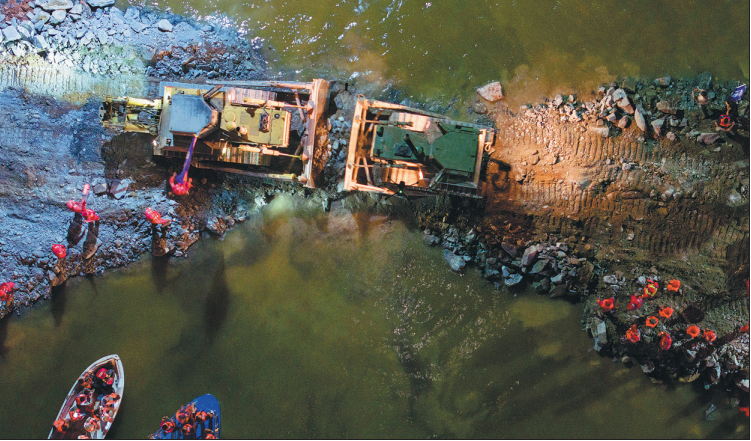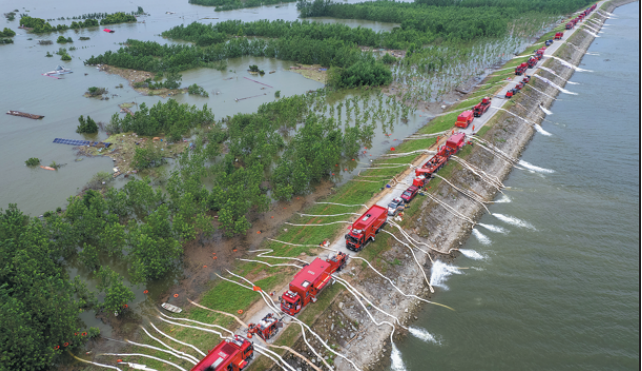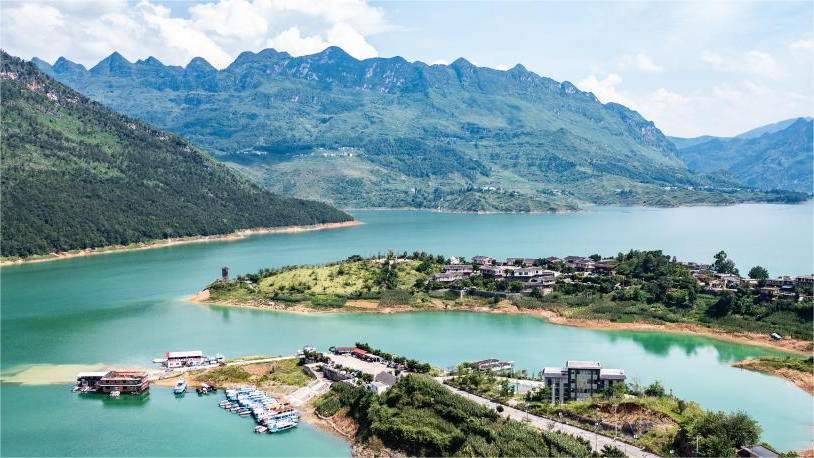Spirit, unity overcome threat of floodwaters

Rescuers work to block the dike breach next to Dongting Lake in Huarong county, Hunan province, on Monday. As of Monday afternoon, 180.5 meters of the 226-m breach in the dike had been sealed, according to the Yueyang flood control and drought relief headquarters. (CHEN ZEGUO/XINHUA)
When he heard loudspeakers issue an emergency warning at 4 pm on July 5 about the breach of a dike separating his township in Hunan province from China's second largest freshwater lake, Wang Jinlong's first thoughts were for his elderly parents.
Wang, 60, lives in Tuanzhou, Huarong county, which sits beside Dongting Lake, and he has a prosthetic leg due to an accident he had in 1999.
While his home is located about 1 kilometer from the breach, he did not heed the warning to immediately head to higher ground. Instead, he hobbled in the opposite direction to the house of his parents, who were both in their mid-80s.
He moved as fast as he could because he knew how destructive floodwaters can be. Water from a similar dike breach struck the township in 1996, leaving 14 people dead. Wang lost his home in that flood.
He eventually reached his parents and they had enough time to make their way to a safe section of the earth-and-rock dike. From his vantage point, Wang could see the floodwaters rising over his house. A pig, dozens of chickens, a fish pond, and all his worldly possessions disappeared before his eyes.
He realized the waters had taken everything from him for a second time. "My heart is broken and I am devastated," he said.
Wang and his parents spent the night on the dike before local authorities transferred them to a temporary shelter at a county vocational school the next day.

Rescuers drain floodwater from an area near Dongting Lake in Huarong county on Tuesday. (CHEN SIHAN/XINHUA)
Rapid response
The dike breach followed 17 days of heavy downpours in Hunan, the longest continuous period of heavy rain since 1961.
Dongting Lake connects major rivers in the province with the Yangtze River, and authorities issued the first flood warning for the year on June 30.
By 5:48 pm on July 5, water had begun rushing through channels in the dike. The breach in the dike eventually expanded to 226 meters after failed attempts to fill the gap.
An area of 47.6 square kilometers — 92.5 percent of the township — ended up being flooded, but there have so far been no reports of casualties.
When Liu Guanghui, 67, heard the notice from the loudspeaker, he thought that it might be his time to die.
He suffered a cerebral hemorrhage five years ago and has since had to use a wheelchair and rely on a part-time caregiver. His wheelchair is not in good working order and it is difficult for him to get around.
Liu lives by himself as his three adopted sons all live in Changsha, the capital of Hunan.
"Luckily, two of the village officials, one named Zu Shuang and another who I do not know, came to my house and carried me and my wheelchair to a safe location," he said. "I did not have time to thank them before they rushed off to save more people."
Despite the initial concerns of a potential disaster, by Monday night the breach was sealed, just three days after the accident happened.
By Tuesday, rescue crews had started to drain floodwater from Tuanzhou, which is expected to take 17 days to complete.
All 7,680 people living in Tuanzhou have been transferred to safe places, with around 4,000 of them settled temporarily at five schools in the county. The remainder are staying with friends and family.
Zhang Yingchun, executive deputy governor of Hunan, said more than 4,200 emergency rescuers and over 3,000 pieces of equipment were assisting in the relief and rescue efforts.
Lessons from the past
Jia Mengjun, 58, and her husband Yu Minghu, 60, both villagers from nearby Qiannan county came to see the dike and embankment on Monday afternoon because they were worried.
In 1996, the couple were among the frontline volunteers patrolling and defending the embankment. After failed attempts that year to stop a breach, their house collapsed and their belongings were washed away.
"Seeing how well organized the rescue efforts were this time and how much effort the Party and government have made to protect us, we feel safe," they said.
Peng Juxiang, 63, another villager from Qiannan, also went to the embankment.
After the dike was breached in 1996, she lived on the embankment for more than three months waiting for the water to recede so her family could start rebuilding their home.
"When I heard the dike had breached, I wanted to cry," she said, recalling the painful memories and hardship she went through 28 years ago.
"The rescuers were so young and worked so hard. The weather was too hot, I felt sorry for them," she said.
According to Yueyang city's records, on July 19, 1996, a dike breach occurred at Tuanzhou, leaving 14 people dead and causing direct economic losses of 550 million yuan ($75.6 million).
On July 27, 1996, the embankment was breached again, killing 17 people in Qiannan and resulting in economic losses of 2.36 billion yuan.
Shelter, kindness
By Tuesday morning, one of the temporary shelters set up in Huarong Vocational Secondary School had accepted around 1,400 villagers. They are living in the students' dormitories while the students are on summer vacation.
The dormitories are equipped with air conditioners, and the displaced villagers are provided daily necessities, free meals and support from volunteers.
Li Junhui, the principal of the school, has a hoarse voice after dealing with more than 200 phone calls every day. He has had very little sleep.
He said the school immediately started preparation and coordination work after they were notified by the local government on Saturday that it would be used as a shelter for people made homeless by the floods
All of the school's 200 staff, including teachers, are working as volunteers, while some students and outsiders have also joined the support efforts, he said.
Li said he had experienced of a similar situation. When he served as a primary school principal in another township, his school was used as a shelter for flood-affected people, he said.
"The first and most important thing for us is to comfort them, talk with them, and answer their questions," he said. "They have lost their homes, and we need to do our best to make sure they live comfortably at our school."
Luo Jiayi, 19, is a college student at the Inner Mongolia University of Science and Technology and a native of Huarong. After learning about the flooding, he immediately took a train from Hohhot to Huarong.
The house of his grandfather, who lives in Tuanzhou, was inundated with water. The elderly man suffered a foot fracture while fleeing the floodwaters.
Luo has volunteered to work at the shelter. He does everything from registration to distribution of items and heavy lifting of items.
"I want to make the greatest effort and do my part," he said. "Many of them (the homeless) are the same age as my grandfather and I often chat with them. After several encounters, they treat me very nicely," he said.

A villager receives a medical checkup at a makeshift shelter in a vocational school in Huarong on Sunday. (XUE YUGE/CHEN ZHENHAI/XINHUA)
Staying, or leaving?
He Chunlian, 68, and her second husband Zhang Youquan, 57, are among the people being temporarily relocated.
He has heart disease. She said after she learned from the loudspeaker that the dike had breached, her heart started racing and she fell down and injured her knee.
The couple have a small 50-square-meter apartment in Tuanzhou, which is now flooded. All the family's electric appliances have been destroyed, He said.
Zeng Yuanxiu, 85, is staying in a dormitory. Her home is about 100 meters away from where the dike was breached. She said she probably would have been washed away if it had not been for the quick actions of her neighbors who knocked on her door and carried her to the dike.
She did not have time to grab any of her possessions. "I was so terrified. Even though I am 85, I am still afraid to die," she said.
Zeng's two daughters live in other provinces, and she has lived on her own since her husband passed away.
The couple were among the first group of people to move to Tuanzhou when the township was established in 1977. They moved from a mountainous township in Huarong to take advantage of the fertile land in the floodplain.
Recalling all the hard work she and her late husband did to rebuild their house after the 1996 flood, Zeng said she still wants to go back to see her home, but possibly for the last time. She wants to move back to her mountain home as she has experienced enough floods in her lifetime.
"In 1996, the breached dam was rebuilt by our villagers. Words cannot describe how much hardship we have endured," she said.
Liu Xiaorong, 69, is one of the lucky ones. Her house was not flooded because it is located in a higher area of the township. However, she was still transferred to the school because there was no electricity or drinkable water in the township.
"The volunteers treat me so nicely that I do not want to go back," she joked.
However, after a few moments of reflection, she said: "I still want to go back, as nowhere compares to home. Tuanzhou is a place that nurtures great people as hardships forge people."
Photos
Related Stories
- Second defense line imperiled after dike breach in central China
- Repairs to Dongting Lake dike completed after late-night effort
- China activates Level-IV emergency response to flooding in Chongqing
- Firemen shoulder-lift trapped villagers after Hunan dike breach
- Unwavering resolve of armed police forces combating floods in Central China
- Water level at Hankou Station on Yangtze River drops below warning level
Copyright © 2024 People's Daily Online. All Rights Reserved.









